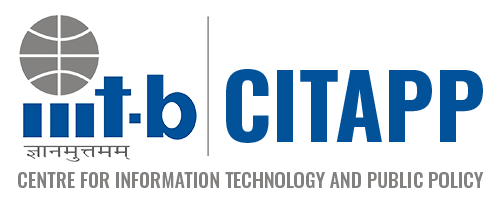The Center for Information Technology and Public Policy (CITAPP)
International Institute of Information Technology Bangalore (IIITB)
organized a talk titled
WhatsApp Vigilantes? An exploration of citizen reception and construction of WhatsApp messages’ triggering mob violence in India
by
Anushi Agrawal & Nihal Passanha
Maraa, Bangalore
3:45 pm – 5:15 pm on 17th September 2019 (Tuesday)
Venue: Room A-310, IIITB campus
26/C, Electronic City, Hosur Road, Bangalore
About the talk: In last couple of years there has been an increase in number of cases of mediated violence against a specific community or specific individuals where vigilantes mobilise almost instantaneously (even if not always spontaneously) through the use of peer to peer messaging applications such as WhatsApp. The incidents of violence have increased in absolute numbers, most of them are now recorded and shared amongst social media users, and reportage on violence has increased in some sections of the media. In much of the daily discourse (interpersonal, media, policy and legal), WhatsApp is often seen to play a central role in not just operationalising violence but also causing it. This research study complicates the relationship between the use of WhatsApp and the increase in vigilante-based violence. The study examines how users understand and imagine solutions to the spate of ‘WhatsApp lynchings’. The study explores various distinct but inter-related notions including disinformation, forms of mob violence, socio-political contexts for technology use, user motivations, affordances and infrastructures, media literacy and policy and regulation.
Bios:
a. Anushi Agrawal: Anushi is working in community media sector as a facilitator and a researcher towards promoting participatory approach to communication. Her work is centered around community radio, media policy with focus on the issue of ownership and research on gender based violence. Earlier she used to work as television journalists and is now blending her experience of mainstream media and her understanding of working with media practitioners at grass root level towards designing research-based, creative, and participative programming for diverse platforms. She is interested in media and communications research and media policy studies through the lenses of gender, labour and ownership.
b. Nihal Passanha: Nihal is a graduate of the University of Edinburgh with a background in Social Anthroplogy. His research has led him to the exploration of Dalit Christian identities in Maharashtra which he plans to extend further. He was also part of a project tracking the interplay of various identities around the country that come together within a train.
c. Maraa: Maraa is a media and arts collective based in Bangalore. Our work is centered around freedom of speech and expression across three domains – strengthening community media platforms, democratizing usage of urban public spaces through creative practice and prevention of sexual violence against women and adolescents. We use the lenses of gender, labour and caste to approach our work. We do capacity building, curation, production and research in our areas of work.
